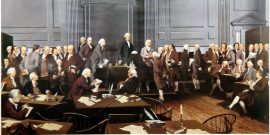Why are reforms that empower the people so often denounced as "undemocratic"?
No Escape from Politics—or Patriotism
Editor’s Note: This essay is part of a symposium on vindicating a prudent politics within the GOP.
At a moment when our cultural and political elites either celebrated violence, mayhem, and lawlessness in the name of social justice, or remained silent as statues toppled and the great symbols of the Republic came under assault, that most imperfect of political leaders—Donald J. Trump—spoke truth at Mount Rushmore (July 3, 2020) when he proclaimed: “No movement that seeks to dismantle these treasured American legacies can possibly have a love of America at its heart. Can’t happen. No person who remains quiet at the destruction of this resplendent heritage can possibly lead us to a better future.” And he added that “the radical ideology of attacking our country…would transform justice into an instrument of division and vengeance and it would turn our free and inclusive society into a place of repression, domination, and vengeance. They want to silence us but we will not be silenced.” Those words remain true, perhaps even truer, after the lamentable events of January 6, 2021, rightly and unequivocally condemned by all responsible conservatives.
Trump did not deliberately incite violence, an example of the “Big Lie” that the Left likes to invoke in prepackaged unison. But his erratic behavior after November 3, 2020, and his failure to raise genuine questions of electoral integrity in a responsible way (I have in mind massive changes to the electoral laws, ballot harvesting, unprecedented levels of mail-in voting, corrupt Democratic urban machines) played a significant role in the unfolding of our civic tragedy. The unreasonable pressure Trump put on his loyal and honorable Vice President served no good purpose, and Trump’s initial hesitancy to unequivocally condemn the violence on January 6, 2021 (that condemnation came hours later) revealed a failure of character and leadership. If much of the Left is remarkably selective in its condemnation of violence, principled conservatives are obliged to condemn lawlessness in all its forms.
But the Left’s response has been unprecedented, vengeful, and openly and aggressively authoritarian. Leftist violence (even on Inauguration Day in Denver, Portland, and Seattle) has been passed over in silence. The left-liberal commentariat now sees “sedition” and “insurrection” everywhere, failing to make any distinction between a few hundred kooks and law-abiding supporters of President Trump (or conservatives more broadly). Social media companies have become engines of political and intellectual repression, silencing imagined “enemies of the people” (a dreadful and evil Leninist appellation President Trump should have never used, even in jest). Well-known journalists openly advocate shutting down Fox News and any media outlets that challenge progressive pieties. And the very same people who favored “dismantling” police departments, attacking our civic inheritance, and who confused rampant urban violence with “mostly peaceful protests” now claim to be the authoritarian enforcers of “unity” and “democratic norms.”
There is something surreal and Orwellian (to use that unavoidable word here) about this politically-enforced amnesia. Journalists and politicians who pedaled the risible “Russian hoax,” accusing the former president of being a Russian agent at worst, or a “colluder” at best, now announce that they will tolerate no “false narratives.” These progressivist demagogues who are no liberals (free-speech liberalism appears to be moribund, if not outright dead), have used the events of January 6, 2021 to promote intellectual and political conformity and to create the rudiments of a left-wing national security state. That is where we are, and it will do no good to think, as some conservative journalists do at old and once venerable magazines, that all would be well if Mr. Trump was driven from the face of the earth. Anti-Trump ire is a poor substitute for a genuinely conservative politics of prudence.
Nor are ritualistic denunciations of populism and nationalism particularly helpful at this moment in time. Populism is clearly not enough, neither for the country nor for its own ambitions. Statesmanship matters and statesmanship at its best informs and elevates the residual good sense, or common sense, of the American people. And it requires character, too. We are long past the time when we can count on “a silent majority” uncorrupted by moral nihilism and the regnant academic and intellectual “culture of repudiation” to save the country. Still, as the late Irving Kristol never stopped reminding us, the old Platonic critique of democracy and democratic man (in five or six marvelous pages of Book 8 of Plato’s Republic) has been in decisive respects inverted. It is less the people’s passions that threaten democracy but an elite that is far from refined, restrained, or aristocratic. Our credentialed class continually flirts with theories that subvert common life—from doctrinaire egalitarianism in its various forms to “gender theory” and an identity politics that has contempt for common humanity—because they judge people guilty for who they are and not what they have done. In the not-so-distant past, many of the same people apologized for murderous Communist regimes.
In contrast, many ordinary people are still proud to be patriots, and some remain stalwart people of faith. But the culture of repudiation and the above-mentioned fashionable ideological “theories” are reshaping the culture, and the education of young people from kindergarten through graduate school. In response, populism needs to be informed by statesmanship and a more attentive regard to the constitution of 1787. As Aristotle, Burke, the Founders, Tocqueville, and Lincoln have all taught us in their different ways, the human will, whether of the one, the few, or the many, is an insufficient foundation for justice, the rule of law and self-government. A prudent, constitutional populism, defending the country against those who define democracy as the repudiation of our civic and civilizational inheritance, is the only way forward.
But that will demand not only thoughtful intellectual venues like Law and Liberty, the sponsor of this symposium, but new universities open to liberal learning and resistant to the destruction of what T.S. Eliot famously called the “Permanent Things.” Without cultural and spiritual renewal, there cannot be a revival of true statesmanship, constitutionalism, and the self-command central to the arts of republican self-government. But that renewal is also impossible without a decent and reasonably free political order. For example, there cannot be a reasonable chance for a “Benedict Option” to succeed unless our political order remains open to authentic religious liberty and non-relativistic understandings of human freedom. There is no escape from politics, and the imperatives of political reason. There is no running for the sacred hills.
The late Roger Scruton is extremely helpful in showing prudent and principled conservatives (and old-fashioned liberal constitutionalists) all the obstacles that we confront. We on the conservative-liberal side understand that every civic order is also a moral order, one that inculcates and defends “existing norms and customs.” In one of his last books, Conservatism: An Invitation to the Great Tradition, Scruton argued that on the Left “it is the negative that inspires.” Left-liberals no longer believe in discursive reason but reduce every argument and action to the unholy trinity of race, class, and gender (however, class is on the wane at the present moment, it seems). The Left has ready-made “isms” and “phobias” (racism, xenophobia, homophobia, sexism, and now transphobia) to conveniently target conservatives—or people of good sense more broadly—and “to dismiss every aspect of our cultural capital.” The Left increasingly identifies freedom with permissive egalitarianism, and cultural and moral relativism. They are unforgiving and see oppression and domination in decent if imperfect traditions, institutions, and cultural practices.
Democratic patriotism is thus never reducible to an abstract attachment to rights or to some universalist liberal political philosophy. Men and women fight and die, or risk their lives for free countries, not for a universalism or cosmopolitanism that is far too abstract to be concrete or real.
A truly prudent conservatism must face this cultural assault soberly, intelligently, but firmly. What the great French social scientist Dominique Schnapper calls “extreme democracy,” a democracy that rejects, repudiates, cancels, and above all shows no gratitude to our forebears is no democracy at all. It is its self-destructive “corruption,” to use the language of the great French liberal political philosopher Montesquieu. It is a faux moderation, a “false reptile prudence,” to quote Edmund Burke, that calls on true conservatives and conservative-minded liberals to accommodate themselves to a democracy that subverts its essential moral and civic preconditions. It is the path of perdition, based on a false and pernicious understanding of democracy.
In a brilliant recent piece on “Trump and the Failure of the Expert Class” in the Wall Street Journal, Barton Swaim convincingly argues that the illiberal Left will always accuse conservatives and classical liberals of “carrying out an ‘assault on democracy’.” As Swaim observes, for the Left “democracy” no longer means self-government, or the will of the people as reflected in the electoral process, but rather “progressive policy aims,” including efforts at ever more egalitarian and redistributionist social policies. Swaim is undoubtedly right. But the cause of this appropriation of a meta-political understanding of “democracy” runs much deeper. As the political philosopher Leo Strauss already saw in the 1950s, “modern progress,” the secular faith most evident in advanced intellectual circles, has long ago replaced the old and venerable distinction between right and wrong, good and evil, with an insidious distinction between “progress” and “reaction.” This distinction was carried out to murderous extremes by almost all Communist regimes in the 20th century. When activists appeal to “the right side of history” they are by implication damning those who hold on to the old and noble distinctions between good and evil, right and wrong, nobility and baseness. Democracy, so understood, so radicalized, thus becomes an instrument of authoritarian, even totalitarian coercion and domination. There is more than a whiff of the old Russian nihilism, and the cruelties of 1917, in a progressive ideology that has lost touch with the old sense of modesty, humility and limits that in different ways informed the meeting place of the Christian religion and true liberal democratic politics.
As prudent and principled conservatives move forward in these troubled waters, we must remain thoughtful and spirited defenders of what Roger Scruton has called “humane national loyalty.” As Pierre Manent has pointed out on many occasions, the nation is the indispensable political form that gives life—and limits—to the exercise of democratic consent. It is the frame or body for democratic self-government. But notice that neither Scruton nor Manent—our two most thoughtful philosophical defenders of the self-governing nation—use the idiom of “nationalism.” When one speaks of nationalism, one is already off to a bad start. The word has come to denote, for better or worse (I think worse), a pathology, a series of excesses. Regardless, thoughtful conservatives must remain defenders of the nation, of territorial democracy, as the type of home or belonging appropriate to a free society conscious of its intrinsic links to those who came before us, and those who will surely follow us. To put it simply, to reject the nation as political form, is to reject the framework that gives life to democracy.
Democratic patriotism is thus never reducible to an abstract attachment to rights or to some universalist liberal political philosophy. Men and women fight and die, or risk their lives for free countries, not for a universalism or cosmopolitanism that is far too abstract to be concrete or real. Populist nationalism needs the best conservative political thought to make these essential, humane, and salutary distinctions. And as the thoughtful liberal-centrist political theorist Steven B. Smith points out in his very fine new book, Reclaiming Patriotism in the Age of Extremes, “Cosmopolitanism has become the new civil religion of the intelligentsia—in Raymond Aron’s words, the ‘opium of the intellectuals’.” It is an ideology, not a civic creed that can hold a free people together, or point the way to a humane future.
Populism and nationalism in their inchoate forms are clearly not enough. But they are a beginning, albeit an imperfect one. They need tutoring from wise, sound old wisdom. The task of recovering the art of prudent conservativism largely lies ahead of us. But we should not confuse that task with settling for a faux moderation that ignores the power of the totalitarian temptation in elite circles, and in that pernicious vehicle of “cancelling” we call social media. But as we confront the grave crisis before us, a systematic attempt to cancel and criminalize conservative wisdom, and all the traditional moral contents of life, we must not despair. We can be hopeful (in the long run at least) because we are defending the goods of life, the concrete and the real, against the angry forces of negation. And that gives us a dialectical advantage of some enduring significance and magnitude.



